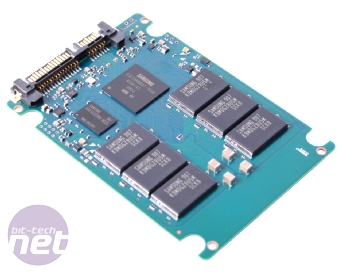Corsair P256 256GB SSD
Manufacturer: CorsairUK Price (as reviewed): £529.99 (inc. VAT)
US Price (as reviewed): $669.99(ex. Tax)
SSDs have come a long way in the last six or seven months, not only in terms of capacity and cost but also when it comes to performance. Affordable drives based on JMicron drive controllers - which showed promise but were let down by poor random write speeds - have given way to those powered by dedicated ARM processors and dedicated cache chips.
We’ve already looked at one such drive in the form of OCZ’s Vertex, built around Indilinx’s 'barefoot' platform and it crushed every other MLC based drive on the market at both sequential and random speeds, while suffering very little from the performance degradation that can affect Intel’s SSDs. It was the first SSD we’ve seen that’s substantially faster than a conventional hard disk drive no matter the performance criteria, and it proved worthy of a recommendation.
Today we’re looking at Corsair’s take on an ARM chip and cache enhanced SSD, built using Samsung designed architecture. Considering Indilinx is staffed by ex-Samsung employees the two competing designs will likely share more than a few things in common, so let’s take a closer look.


Click to enlarge - the larger chip is the ARM processor, and the small one alongside it is the 1GB of DRAM
Cracking open the drive’s gorgeous silver casing reveals ten pairs of double stacked Samsung K9MDGZ8U5M 8GB MLC flash memory chips, with another six pairs fitted on the other side to bring the total up to 256GB of storage (238.47GB when formatted). That’s certainly a fair amount of storage for a consumer SSD (we’re not counting PCI-E SSDs as consumer due to their limited availability and bank account demolishing price tags), and is certainly enough for a Windows install and a good few games.
It’s what’s included alongside the standard MLC NAND flash chips that’s interesting though, with Samsung using a 128MB 166MHz DRAM chip as a cache for the drive, with full support for NCQ (native command queuing), although only when the drive is used in AHCI mode. This memory is more commonly used in mobile devices such as sat-navs or mobile phones, and is twice as much as the 64MB of SDRAM used in the OCZ Vertex. Whether this has any effect on drive performance is something we'll be watching for in our testing.
Accompanying the 128MB cache is an S3C29RBB01 ARM processor, promising read speeds of up to 220MB/s and write speeds of up to 200MB/s. A similar processor used in the Vertex not only eliminated drive stutter but produced some astonishingly fast results and we’re expecting the same from the Corsair, especially as it has the added bonus of the 128MB DRAM cache.
What’s perhaps the most surprising thing about the Corsair P256 is while it’s obviously cutting edge hardware, it’s not extortionately expensive. £530 for a 256GB drive works out to £2.22/GB, a fair bit cheaper than the OCZ Vertex which costs £2.50/GB for the 120GB model and £2.60/GB for the 256GB – a saving of twelve and seventeen percent respectively.
So it has the tools, but does the Corsair P256 have the talent? We fired up the bit-tech storage benchmark machine and found out.

MSI MPG Velox 100R Chassis Review
October 14 2021 | 15:04











Want to comment? Please log in.